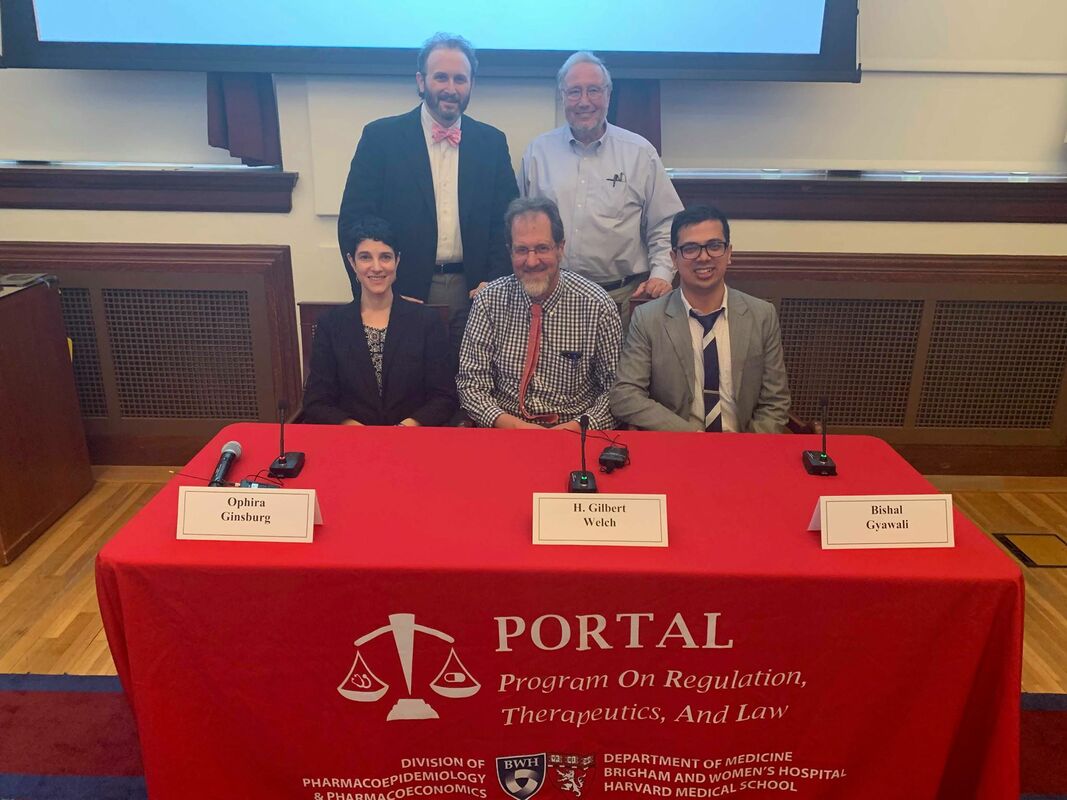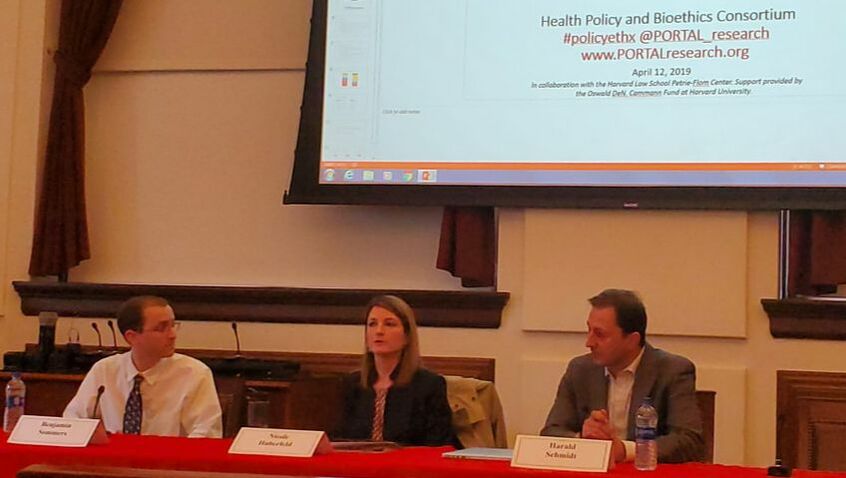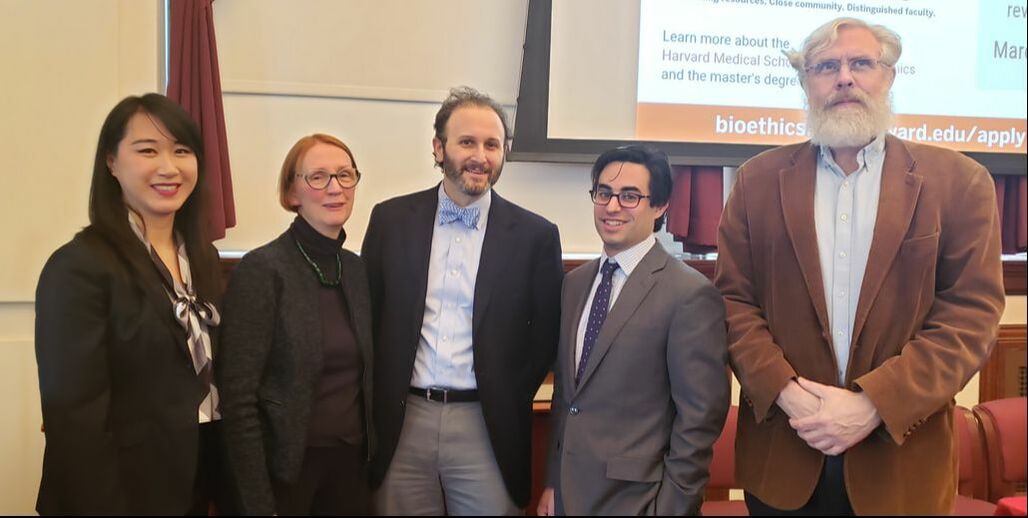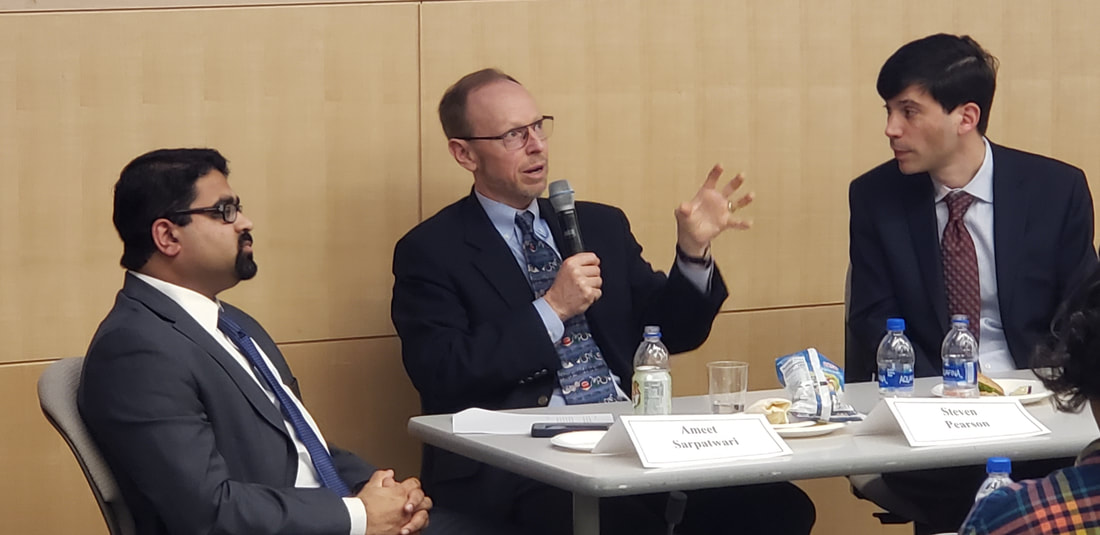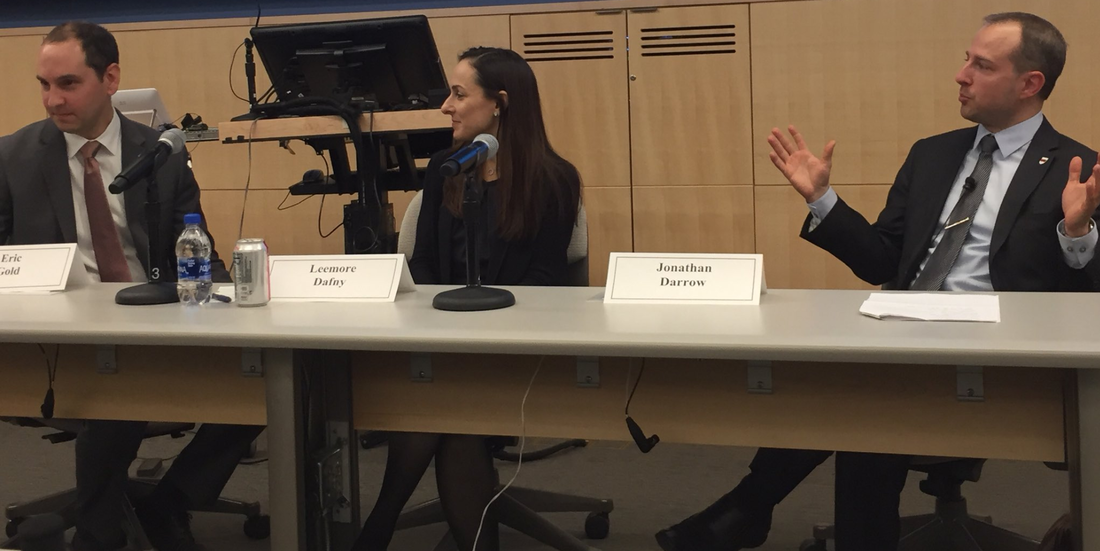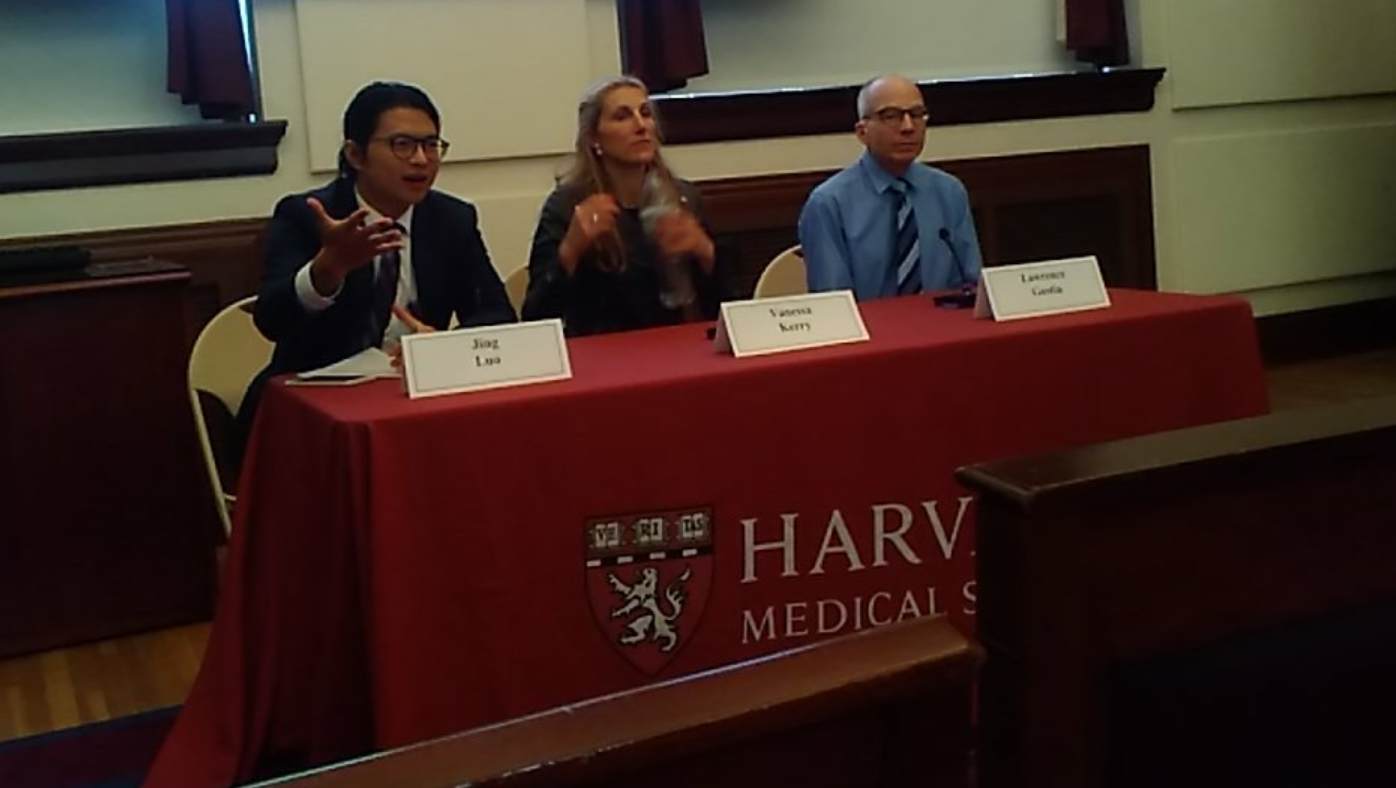PORTAL runs a monthly seminar series that convenes two experts from different fields or vantage points to discuss how various aspects of therapeutic development and use are affected by ethical norms, laws, and regulations. These are organized in conjunction with the HMS Center for Bioethics supported by the Oswald DeN. Cammann Fund at Harvard University.
You may join the discussion on Twitter before, during, or after each event by following @PORTAL_Research and using the hashtag #policyethx.
You may join the discussion on Twitter before, during, or after each event by following @PORTAL_Research and using the hashtag #policyethx.
Health Policy & Bioethics Consortia 2018-2019
Conundrum of Cancer Screening: When Should We Screen and When Should We Not?
May 10, 2019, 12:30 - 2:00 PM
Waterhouse Room, Gordon Hall | Harvard Medical School
Screening the general population to detect cancers early is a key source of controversy. Although the principle of detecting cancers early is attractive, the tumors detected may not progress in the person’s lifetime, subjecting these patients to unnecessary stress of diagnosis and treatment. However, some patients do benefit from early detection. As a result, many patients undergo certain screening tests, e.g. PSA or thyroid exams, despite there being evidence of little benefit, while other screening programs like that for cervical cancer have not been successfully implemented despite being proven effective. We will review how to solve this screening paradox, including the roles of regulatory authorities and guideline committees to recommend for or against cancer screening, and implementing cancer screening programs on the ground globally--including low- and middle-income countries--when evidence of benefit is available.
May 10, 2019, 12:30 - 2:00 PM
Waterhouse Room, Gordon Hall | Harvard Medical School
Screening the general population to detect cancers early is a key source of controversy. Although the principle of detecting cancers early is attractive, the tumors detected may not progress in the person’s lifetime, subjecting these patients to unnecessary stress of diagnosis and treatment. However, some patients do benefit from early detection. As a result, many patients undergo certain screening tests, e.g. PSA or thyroid exams, despite there being evidence of little benefit, while other screening programs like that for cervical cancer have not been successfully implemented despite being proven effective. We will review how to solve this screening paradox, including the roles of regulatory authorities and guideline committees to recommend for or against cancer screening, and implementing cancer screening programs on the ground globally--including low- and middle-income countries--when evidence of benefit is available.
|
EXPERTS:
Ophira Ginsburg, M.D. Associate Professor and Director Perlmutter Cancer Center High Risk Program NYU Langone Medical Center H. Gilbert Welch, M.D., M.P.H. Author, Should I Be Tested for Cancer? Maybe Not and Here's Why MODERATOR: Bishal Gyawali, M.D., M.Ph.D. Assistant Professor of Public Health Sciences, Queen’s University Cancer Research Institute PORTAL Postdoctoral Fellow, 2018-2019 |
The Future of Medicaid's Health Care Safety Net
April 12, 2019 | Harvard Medical School
Medicaid is a federal- and state-subsidized health insurance program for poor people that covers about 75 million people. In the past few years, Medicaid has been the center of a number of political storms, including whether to expand coverage and whether to include so-called 'work requirements.' What does the future hold for Medicaid?
April 12, 2019 | Harvard Medical School
Medicaid is a federal- and state-subsidized health insurance program for poor people that covers about 75 million people. In the past few years, Medicaid has been the center of a number of political storms, including whether to expand coverage and whether to include so-called 'work requirements.' What does the future hold for Medicaid?
|
EXPERTS:
Nicole Huberfeld, J.D. Professor of Health Law, Ethics & Human Rights Boston University School of Public Health Harald Schmidt, M.A., Ph.D. Assistant Professor of Medical Ethics & Health Policy University of Pennsylvania School of Medicine Benjamin Sommers, M.D., Ph.D. Associate Professor of Health Policy and Economics Harvard T. H. Chan School of Public Health MODERATOR: Aaron S. Kesselheim, M.D., J.D., M.P.H. Director, PORTAL Brigham and Women's Hospital |
Genome Editing: Rights and Wrongs
March 8, 2019 | Harvard Medical School
Gene editing technologies offer substantial promise in treating disease, but have also raised important ethical and public health questions about how these innovations should be applied and regulated. Different groups have also sought to patent these technologies. Should patents be allowed in this field? Do they promote incentives for innovation, and how do they complicate thoughtful progress in this area?
March 8, 2019 | Harvard Medical School
Gene editing technologies offer substantial promise in treating disease, but have also raised important ethical and public health questions about how these innovations should be applied and regulated. Different groups have also sought to patent these technologies. Should patents be allowed in this field? Do they promote incentives for innovation, and how do they complicate thoughtful progress in this area?
|
EXPERTS:
George Church, Ph.D. Professor of Genetics Harvard Medical School Jeantine Lunshof, Ph.D. Research Scientist-Ethicist MIT Media Lab Jacob S. Sherkow, J.D. Professor of Law Innovation Center for Law and Technology New York Law School MODERATOR: Lois Sheng Liu, J.D., M.Sc. Postdoctoral Fellow, PORTAL Brigham and Women's Hospital |
Applications & Dangers of Artificial Intelligence in Health Care Technology
February 8, 2019 | Harvard Law School
Black-box medicine—the use of opaque computational models to make care decisions—has the potential to shape health care by improving and aiding many medical tasks. For example, IBM Watson for Oncology is a machine-learning system that intends to help clinicians quickly identify essential information in patients’ medical records and explore treatment options for 13 cancers. However, it has only recently emerged that the recommendations Watson for Oncology gave for cancer treatments were “often incorrect” and that IBM kept this defect secret for over a year. What are the ethical and legal issues of black-box medicine? When do algorithms operate like a “black box“? How can we ensure that artificial intelligence technologies deliver what they promise?
February 8, 2019 | Harvard Law School
Black-box medicine—the use of opaque computational models to make care decisions—has the potential to shape health care by improving and aiding many medical tasks. For example, IBM Watson for Oncology is a machine-learning system that intends to help clinicians quickly identify essential information in patients’ medical records and explore treatment options for 13 cancers. However, it has only recently emerged that the recommendations Watson for Oncology gave for cancer treatments were “often incorrect” and that IBM kept this defect secret for over a year. What are the ethical and legal issues of black-box medicine? When do algorithms operate like a “black box“? How can we ensure that artificial intelligence technologies deliver what they promise?
|
|
EXPERTS:
I. Glenn Cohen, J.D. Director, Petrie-Flom Center for Health Law Policy, Biotechnology, and Bioethics Professor of Law, Harvard Law School Ziad Obermeyer, M.D., M.Phil. Acting Associate Professor, Health Policy and Management University of California, Berkeley, School of Public Health MODERATOR: Carmel Shachar, J.D., M.P.H. Executive Director, Petrie-Flom Center for Health Law Policy, Biotechnology, and Bioethics Harvard Law School |
When is a Medical Treatment Worth $850,000? The Value of Luxturna
December 14, 2018 | Harvard Medical School
Luxturna, a gene therapy treatment for a rare form of inherited blindness, was recently approved and administered for the first time to a patient at Massachusetts Eye and Ear Hospital in early 2018 at a cost of $850,000. How should patients, physicians, and the US health care system approach a new generation of gene therapies that offer substantial clinical promise and are made available at such price levels? How do we maximize “health gain” with available resources across the entire population?
December 14, 2018 | Harvard Medical School
Luxturna, a gene therapy treatment for a rare form of inherited blindness, was recently approved and administered for the first time to a patient at Massachusetts Eye and Ear Hospital in early 2018 at a cost of $850,000. How should patients, physicians, and the US health care system approach a new generation of gene therapies that offer substantial clinical promise and are made available at such price levels? How do we maximize “health gain” with available resources across the entire population?
|
EXPERTS:
Jason I. Comander, M.D., Ph.D Assistant Professor of Ophthalmology Associate Director, Inherited Retinal Disorders Service Massachusetts Eye and Ear Institute Steven D. Pearson, M.D., M.Sc. President, Institute for Clinical and Economic Review MODERATOR: Ameet Sarpatwari, J.D., Ph.D. Assistant Director, PORTAL Instructor in Medicine, Harvard Medical School |
Provider Consolidation: Implications for Costs and Quality in Health Care Delivery
November 9, 2018 | Harvard Medical School
In the last decade, the traditional conception of individual physicians or medical groups has been increasingly replaced by consolidation under academic medical centers and other national or regional administrative organizations. What are the implications of such organizational changes for patient care, and how has this trend contributed to overall rising health care costs? How well are antitrust laws designed to ensure proper government oversight of mergers and the entities that result?
November 9, 2018 | Harvard Medical School
In the last decade, the traditional conception of individual physicians or medical groups has been increasingly replaced by consolidation under academic medical centers and other national or regional administrative organizations. What are the implications of such organizational changes for patient care, and how has this trend contributed to overall rising health care costs? How well are antitrust laws designed to ensure proper government oversight of mergers and the entities that result?
|
EXPERTS:
Leemore S. Dafny, Ph.D. Bruce V. Rauner Professor of Business Administration Harvard Business School Eric M. Gold, J.D. Assistant Attorney General, Massachusetts Chief, Health Care Division MODERATOR: Jonathan J. Darrow, S.J.D., J.D., LL.M., M.B.A. Instructor in Medicine, PORTAL, Brigham and Women's Hospital |
Ethical Investment in Global Health Security
October 12, 2018 | Harvard Medical School
Health emergencies around the world in recent years have included SARS, MERS, Ebola, and influenza. These episodes have led to substantial mortality, destabilize governments, and serve as significant risks to economic stability and development. So what steps can we take to enhance global health security? What are the ethical considerations in responding to global pandemics?
October 12, 2018 | Harvard Medical School
Health emergencies around the world in recent years have included SARS, MERS, Ebola, and influenza. These episodes have led to substantial mortality, destabilize governments, and serve as significant risks to economic stability and development. So what steps can we take to enhance global health security? What are the ethical considerations in responding to global pandemics?
|
EXPERTS:
Lawrence O. Gostin, J.D. Linda D. & Timothy J. O’Neill Professor of Global Health Georgetown Law School Vanessa B. Kerry, M.D., M.Sc. Associate Professor of Medicine, Harvard Medical School CEO, Seed Global Health MODERATOR: Jing Luo, M.D., M.P.H. Instructor in Medicine, PORTAL, Brigham and Women's Hospital |
The US Opioid Epidemic: Where Do We Go from Here?
September 14, 2018 | Harvard Medical School
The US has struggled with an epidemic of prescription opioid overuse and abuse, which has contributed to an uptick in illegal drug use and affected communities across the country. Numerous states and organizations have tried different approaches to address the epidemic, including limitations on prescriptions and improving access to treatment modalities. Five years into the crisis, can we begin to understand the advantages and disadvantages of different approaches to addressing the opioid epidemic? Which policies have been most effective?
September 14, 2018 | Harvard Medical School
The US has struggled with an epidemic of prescription opioid overuse and abuse, which has contributed to an uptick in illegal drug use and affected communities across the country. Numerous states and organizations have tried different approaches to address the epidemic, including limitations on prescriptions and improving access to treatment modalities. Five years into the crisis, can we begin to understand the advantages and disadvantages of different approaches to addressing the opioid epidemic? Which policies have been most effective?
|
|
EXPERTS: Jessie Gaeta, M.D. Chief Medical Officer, Boston Health Care for the Homeless Program Assistant Professor of Medicine, Boston University School of Medicine Andrew Kolodny, M.D. Director, Physicians for Responsible Opioid Prescribing (PROP) Co-Director, Opioid Policy Research Center Heller School for Social Policy and Management, Brandeis University MODERATOR: Michael S. Sinha, M.D., J.D., M.P.H. Fellow, Harvard-MIT Center for Regulatory Science, Harvard Medical School Affiliated Researcher, PORTAL, Brigham and Women's Hospital |
|
Program On Regulation, Therapeutics And Law (PORTAL)
Division of Pharmacoepidemiology and Pharmacoeconomics 1620 Tremont Street, Suite 3030 Boston, MA 02120 |


